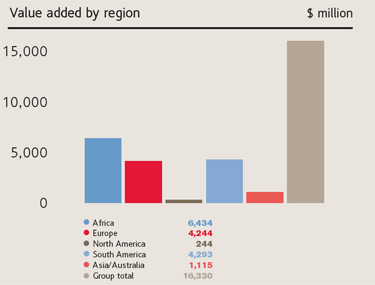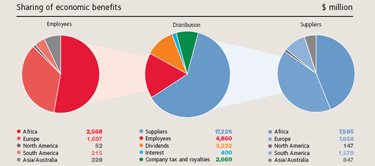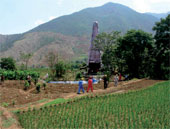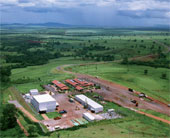|
In this report, we give a picture of the value distributed by region by the Group as well as the key beneficiaries. The Group value-added numbers reflect managed subsidiaries and an equity-accounted share of joint ventures. Similar distributions take place at each of our operations. To provide a better picture of localised value, we are working with the ICMM to develop a methodology which would reflect accurately the benefits of a natural resource endowment to a local community. To test the methodology, we commissioned a survey of the Lebowa platinum mine in South Africa and provide a brief overview of the findings.

Anglo Platinum’s Lebowa mine in South Africa makes a significant contribution to the local economy by creating jobs, supporting local suppliers, paying taxes and funding
social projects.
A study by a postgraduate student was commissioned by Anglo American in 2006 to trial a methodology for assessing the economic impact of a mine, for use across the business.
The study was conducted in accordance with the ICMM guidelines. Assessments of individual mines will contribute to wider research by the ICMM, which aims to draw more general conclusions about the economic contribution of mining as an industry. Lebowa was selected as a case study because it is a mature mine in a developing country and relatively isolated from other sources of economic activity.
The Lebowa area suffers from high levels of poverty and has an unemployment rate of 68%.
The mine employs 2,138 people, more than 80% of whom are local residents.
Their combined wages total R288 million ($42.5 million)
a year. A further 2,680 people currently work for the mine as contractors and an estimated 2,635 people are employed by its suppliers.
Anglo Platinum offers training for local suppliers to help them tender for higher-value skilled projects. This helps to build entrepreneurial skills in the region.

Click to view a larger version
In addition to the R83 million ($12 million) paid in taxes in 2005 (of which R35 million ($5 million) was income tax collected on government’s behalf from employees), significant tax payments are made by suppliers and contractors. Lebowa mine also contributes to the local economy through social development projects. Anglo Platinum has invested
R8.4 million ($1.2 million)
to build and maintain 14 local schools in partnership with the Limpopo province’s Department of Education. It also contributes to healthcare services, development of infrastructure and projects that improve access to electricity and water.
The Lebowa study helped to identify some gaps in the data, which will be addressed as the methodology is used on another Anglo American mine in 2007. A more detailed summary is available on our website, www.angloamerican.co.uk.
Sustainable societies need strong foundations – built on law and order, health, housing and education, infrastructure, communications and a well-protected biophysical environment. All of this takes money, which is usually derived from companies and individuals in the form of taxes and is, ideally, redistributed for the benefit of the whole society.
The taxes we pay as a company and those we collect from employees on behalf of government are, therefore, important contributions to the creation of wealth and wellbeing in the countries in which we operate. We fully endorse the principle of transparency in our business dealings and we are signatories to the EITI. This UK-sponsored initiative encourages the reporting of taxes and monies paid by companies active in the extractive industries and by countries receiving revenues from the extractive industries.
Over $3,119 million was paid directly to governments in taxes as a result of our operations in 2006 ($2,063 million in 2005) – the increase is a result of both increased revenues and improved reporting. Total tax payments include company taxes, employer taxes, royalties, transaction and other taxes, with the broad aggregates, split on a regional basis, as shown in the table.
In addition, we indirectly contributed some $1,336 million in valued-added tax (VAT) and employee taxes, which we collected on behalf of governments and paid over to them. We believe that this wider tax footprint is a valid reflection of the tax contribution that results from our activities. In many developing countries this is a particular concern as, in the absence of our operations, there would be few alternative sources of income and therefore of tax revenues.
In many countries, the Group’s operations form a fundamental part of the local economy and the socio-economic impact of the Group spreads significantly wider than the operations and their employees. In many cases, there are businesses ancillary to the Group’s operations which would not otherwise exist.
The figures included in this report do not reflect the taxes generated or collected by these ancillary businesses, although their impact could be seen to be as a direct result of the
Group’s operations.
| $ millions |
|
Borne |
Collected |
Total |
| South Africa |
1,034
|
551 |
1,585 |
| Chile |
1,032
|
10 |
1,042 |
| United Kingdom |
235 |
325 |
560 |
| Australia |
234 |
57 |
291 |
| Austria |
48 |
90 |
138 |
| Brazil |
85 |
48 |
133 |
| Russia |
83 |
20 |
103 |
| France |
44 |
39 |
83 |
| Venezuela |
77 |
1 |
78 |
| Canada |
5 |
56 |
61 |
| Poland |
46 |
14 |
60 |
| Others |
196 |
125 |
321 |
| Total |
3,119 |
1,336 |
4,455 |
| |
| * Unaudited amounts of taxes payable directly to governments as a result of our operations (borne) and amounts collected and remitted to governments, such as employee taxes and net value-added tax (collected). |
| $ millions |
|
Africa |
Europe |
N & S America |
Australia/ Asia |
Total |
| Profits |
948 |
178 |
1,140 |
91 |
2,357 |
| Transactions |
28 |
35 |
13 |
0 |
76 |
| Labour |
30 |
172 |
24 |
39 |
265 |
| Royalties and environmental |
55 |
136 |
32 |
89 |
312 |
| Other |
23 |
61 |
10 |
15 |
109 |
| Total taxes borne |
1,084 |
582 |
1,219 |
234 |
3,119 |
| Taxes collected and remitted |
562 |
596 |
121 |
57 |
1,336 |
| Total taxes |
1,646 |
1,178 |
1,340 |
291 |
4,455 |
The total of $4,455 million paid to governments was split between developed countries (36%) and developing countries (64%). Many other indirect tax benefits arise as a result of our operations as our customers and suppliers also pay company, employee and other taxes.
It can be seen that the total tax borne, collected and remitted
by the Group exceeds the corporate tax charge in the Income Statement. There are a number of factors causing this, but the main reasons are that the cash tax numbers disclosed in this report:
- Include taxes and other payments to government in addition to the corporate tax reflected in the Income Statement of the Group, such as some transactional taxes.
- Include taxes and other payments to government not included in the Income Statement of the Group at all, such as taxes borne by employees of the Group, collected by the Group and remitted to government.
- Reflect a range of different tax payment regimes in the countries in which the Group operates. These regimes vary widely and can result in a significant timing difference between the recognition of taxes in the Income Statement and the cash payment being made.
Taxation
The corporate tax charge in the Income Statement for the year was $3,132 million (including share of associates’ tax). The effective rate of corporate taxation paid increased to 32.7% in 2006 (from 26.5% in 2005), largely as a result of the December 2005 tax rate benefiting from the one-off impact of a reduction in the statutory tax rates in South Africa and Ghana. These figures include the share of associates’ tax. Associates (e.g. De Beers)
are not reported on elsewhere in this report, except in financial earnings. In future periods, it is expected that the effective tax rate, adjusted for associates’ tax, will remain at or above the UK statutory rate of 30%.
The Group has a tax strategy which has been reviewed and endorsed by the Board of Directors of Anglo American. Central to this strategy is that the Group’s “Good Citizenship” business principles are followed in pursuing our tax planning and in dealing with tax authorities globally, and that the tax strategy is aligned with the Group’s long-term business strategy.
The Group has one of the largest project pipelines in the industry and an exploration programme that is active in
33 countries.
|
Our products play an essential role in underpinning the quality of life of millions of people around the world. This was shown by record demand for commodities in 2006, which translated into record earnings for the Group. The value generated through the sales of these products is distributed principally to suppliers, employees, providers of capital and governments.

A study of the economic benefits resulting from the Lebowa Platinum Mine has been undertaken to test the Resource Endowment methodology.

In western China, an Anglo Platinum drill rig is used in the search for platinum group metals.

Anglo Base Metals’ Barro Alto nickel project in Brazil was approved in 2006. An average of 36,000 tonnes of nickel, as ferronickel, will be produced per annum over the 25-year life of the mine.
|